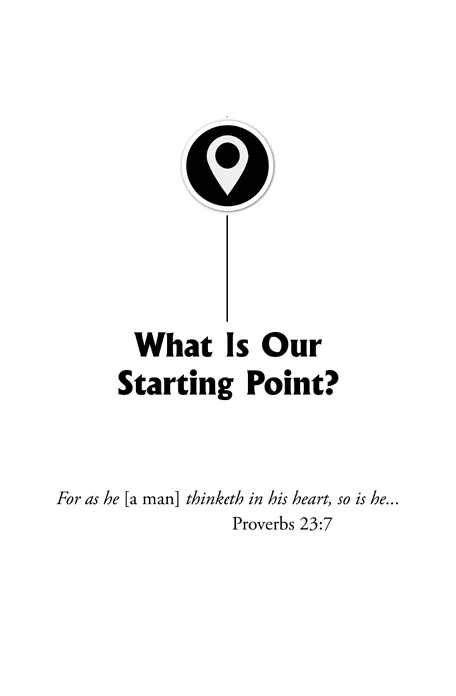![]()
Part I EVOLUTIONISM: ITS HISTORICITY, AND ITS TENETS
![]()
All journeys, small or great, have a starting point. Any project we undertake must start somewhere. The same is true for our worldview. Worldviews do not come altogether as a neat complete package; they may become a complete package as we develop them, but they do not begin that way. They have a starting point. A worldview is the basic, foundational way an individual sees and interprets the world around him. There are two basic worldviews upon which we process the information from our interactions with the world: atheistic naturalism or theistic creationism. Atheistic naturalism believes nature is all there is and that it is self-generating. Theistic creationism believes there is a Creator Who created the Universe we live in. There are varying forms of thought, which can be subsets of these two (agnosticism, Hinduism, Buddhism, etc.), but any variation will fall under one position or the other. Our personal worldview will slant the way we interpret what is observed and experienced in the world around us. All worldviews, atheistic or theistic, involve in some way these questions: When did the Universe come into existence? Where did life and living things come from? Why are people here? How did it all begin? To answer these questions and more, one must deal with the following maxims to form a truly rational worldview.
Maxim One: Human Knowledge Is not Complete
The truth is that mankind does not possess the amount or level of knowledge required to answer questions about origins. Because of this fact, ancient Greek philosophers, who fathered logical, rational thought (after they realized their polytheism was irrational and useless for any kind of workable epistemology), eventually polarized into two basic ways of thinking: atheistic naturalism (the physical realm is all there is and it is responsible for its own existence) or theistic causation (a Great Cause outside of the physical realm is responsible for all things). Certain philosophers reasoned atheistically the Universe came about from one of the following: air, fire, water, or earth, through natural causes. Others reasoned theistically that multiple gods were illogical; therefore, there must only be One Great Cause of all things. Without an outside, authoritative account given by someone who was there, the reasoning person has no way of verifying (knowing) which, if any, position is correct or what actually took place.
Apart from an authoritative source, any product of man’s imaginative reasoning is simply an unverifiable hypothesis (guess) of what may or may not have happened. This becomes a system of belief that exercises a blind faith for those who adhere to it as truth.
Knowing things can come from a number of sources: logic, experiment, testing an idea, or a study of what is already known. Yet all these human activities are done in the present and with incomplete knowledge. Mankind simply does not possess all the knowledge necessary to accurately reason his way to absolute truth—even with the scientific method fully utilized to provide conclusions. Philip Stott notes:
A problem with this ... is that one can only be reasonably sure of the conclusions if every item of data relevant to the problem is available for consideration. This unfortunately for science is not usually the case. Huge gaps in available data may have to be filled in by presupposition and assumption. Such assumptions are totally dependent on the worldview, the underlying belief system, of the seeker after knowledge.
The challenge of missing data is the bane of the forensic investigator who is working to find the real perpetrator of the crime. The same challenge of missing data is the bane to the origins investigator in his quest to understand how and when the Universe came to be. Why is this?
Forensic science develops a case based on the pieces of evidence gathered from the crime scene. However, the enemy for the forensic investigator is the one missing piece (incomplete knowledge) of evidence. All it takes is one piece of evidence to shift the case in another direction with another suspect, which could change the story of what happened. The advantage the forensic investigator has over the origins investigator is that the forensic investigator can return to the sealed scene of the crime to look for more pieces of evidence to test theories; the origins investigator cannot go back to the point of origins to test his theories. The point of origin of the crime, for the forensic scientist, is still present—still workable. However, for the origins investigator, the point of origin for the Universe, earth, and life are not! If the evidence is to be properly understood, the origins investigator needs an outside witness to how the Universe began.
For example, let us take the tragic sinking of RMS Titanic on April 14th, 1912. The tragedy of this event has echoed in modern, western culture for one hundred years. Out of over 2,000 people who were aboard that vessel, including her crew, only about 700 people survived. An investigation into Titanic’s sinking took place. The experts were called in to look at the plans and talk with the survivors. The consensus of the survivors said Titanic broke in two before sinking completely. The experts considered the evidence and downplayed the eyewitness account (after all, how accurate can eyewitnesses be, especially ones that are scared, frozen, and disoriented?) and pronounced as absolute fact that Titanic sank intact. It was not until 1985 that a deep-sea expedition actually found the wreck and learned the eyewitness accounts were true. Titanic did indeed break in two before completely sinking. The eyewitness accounts of what happened at that event did indeed reveal the truth. Even though the experts knew better, they were wrong! The point is, nothing can be more accurate than the report of one who was there and possesses the facts of the event in question.
Realizing that human knowledge is incomplete, an outside source must give information. That same source must possess all wisdom and knowledge in order to give accurate information. If the source lacks even one piece of information, that missing information could completely change the outcome, ergo the source must possess all wisdom and knowledge. Science does not possess all wisdom and knowledge, which leads to maxim two.
Maxim Two: Revelation is required
To know how the Universe began requires testimony from an outside source that possesses all knowledge and wisdom about the event. In the atheistic view, no one can do this, so ideas about what happened allegedly millions or billions of years ago remain in the area of man’s hyper-imagination.
In the Biblical worldview, God Himself was present at the origin of the Universe and revealed what happened in the beginning. This information cannot be learned or discerned by any other source, but by GOD communicating it to humanity. This is called revelation. Revelation is the only basis of knowing from where it all came, since no one but the Creator was present at Creation. It is only through the revelation from this Creator that we can know the true answers to the origins of the Universe.
It is argued that the problem with revelation is that there is no outside referent. In Eugenie Scott’s words, “Information obtained through revelation or authority is difficult to verify because there is not an outside referent that all parties are likely to agree upon.” The major problem with this statement is that it dismisses revelation as being unviable.
The Judeo/Christian Scriptures are anchored to the creation account found in its opening chapters. This means that what is stated there is important to the rest of the Scripture. These chapters tell us the world around us is the product of the Supreme Being introduced in the very first verse of the historic narrative. Therefore, the viable referent to test credibility is the physical world, which is revealed as the product of this Being. This raises the question, Is there harmony and consistency between the Creation as observed around us and the revelation of its creation as given in the first two chapters of Genesis particularly and the rest of the Scriptures generally? The answer is yes. Scientists observe a high level of orderliness throughout Creation; the creation account provides an orderly flow of how this Creation came about. Scientists and nonscientists alike observe negative aspects and corruption in Creation; the creation account provides a logical reason for this negativity, which relates back to the fall and curse that the Creator GOD placed on the first man, due to his rebellion against his Maker and the corruption of w...


